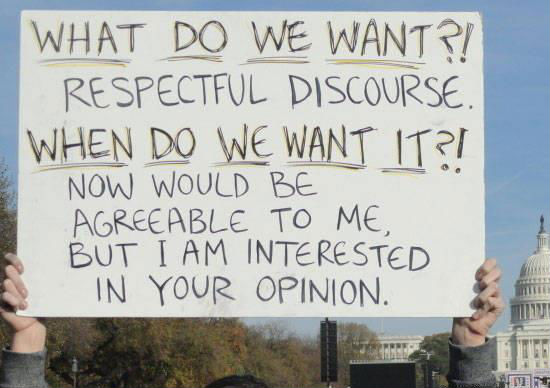Want something better? You Gotta Ask For It
/When my grandma was alive, we had a lot of fun together, but when we did run into problems, it was generally because she was a Guesser and I am an Asker.
By that I mean that Ma wanted me to guess what her needs were. In the time and culture she was raised in, it was polite for people to be indirect in their requests of others, to pick up on subtle signs, and to fulfill unuttered desires. In Guess culture, when someone correctly guesses your desire and fulfills it, it is a mark of love and respect. But even when desires go unguessed, there is still a sense of plausible deniability — never actually saying what you want means you can’t be humiliated when you don’t get it.
My communication style is the exact opposite of this. Having been raised by wolves, I made enough mistakes reading subtle social cues that I learned not to put too much stock in them. In fact, once I realized what a thankless task it is to try to decode the opaque behaviors of other people, I gave it up. Instead, I learned to ask for what I want directly, and trust the askee to respond to me honestly. Sure, I have to open myself and admit that I actually want something and also face the possibility of hearing No in return, but it’s worth it to me to save the goofiness of having to analyze and decipher and guess.
As you can imagine, Ma’s way and my way didn’t always jive. Like, if she needed me to take her to the drug store, instead of saying, “Hey Meg, can you take me to the drug store?” she would talk about how she needed to get her prescriptions but she wasn’t sure how she was going to get them, and she was almost out of pain pills but maybe she could take the bus there or one of her friends could pick them up.
Generally I knew what she wanted — she wasn’t subtle! — and although the indirectness of it all drove me bananas, I’d get her to the drug store in the end. But there were a few times when I missed the Ma signal in the sky and she went without what she needed and, even worse, felt like I didn’t care about her. Which would make me feel like a turd. :(
For the longest time I couldn’t figure out what was bugging me so much about all this, but then I read this piece about Ask Culture and Guess Culture, and things clunked into place in my head. I spoke with her about it, and true to my nature I asked her directly to be more direct with me about her needs. I explained that I loved her and I was always going to help her but that I needed her to be clear with me so I could.
And I guess she saw the good sense in it, and maybe was even relieved to not have to beat around the bush anymore? Because for the last years of her life she was much more direct with me. It was much simpler and much more fun for both of us.
Now, the discussions I’ve seen of Ask vs Guess Culture are careful to treat both communication styles like they are equally valid ways to live, but I have come to understand that they aren’t. In fact, it’s my ardent belief that, for human adults, asking is superior to guessing in almost every day. Especially for women. Especially at this time in history.
Why? So many reasons!
Guessing is Inaccurate.
This is one of the reasons babies kick parents’ asses so hard — there’s no way to know what’s wrong with them, and there’s nothing to do but guess until you find something that makes them stop screaming. Once they learn how to speak, it gets a little easier. But it’s important to remember that even with people you love and spend loads of time with, you still don’t know what they are thinking. You may think you know, and you may even be right, but there is only one reliable technology for finding out and that is asking.
If you guess instead of asking, then you are by definition basing your actions on unverifiable data.
Guessing is Incomplete.
On an abstract level, most of us can buy into the idea that every person is a special snowflake, each of us a universe unto ourselves. But in everyday life, we collapse the ridiculously huge and complex interior lives of other people into sound bites. This is what makes it easy to say “Poor people should just stop spending all their money on giant TVs” and “Fat people should just not eat so fucking much” and “If you didn’t want a baby then you shouldn’t have had sex!” and a million other possibly true but incredibly reductive and completely unhelpful things.
This scientifically demonstrated phenomenon even has a name — it’s called the Attribution Error — and it means that we have lots of very reasonable reasons why WE did some fucked up shit, but everyone else’s reasons are excuses. Our problems are attributable to complex forces; the problems of others are attributable to them being nimrods.
This is an Error — it says so right in the name — and humans are never more susceptible to it than when guessing. Situations are always more complex from the inside than they are from the outside, and sharing those complexities is called having a relationship.
Asking is quite literally the only way we can delve into the deep reality of another human soul.
Guessing is Manipulative.
Sometimes this manipulation is intentional — a conscious stirring of the pot meant to unsettle or even wreak havoc — and sometimes it’s not. But make no mistake here: requiring the people around you to conduct a scavenger hunt just to discover your wants and desires is by definition a manipulation.
Does that sounds fun to some people? I guess it must. But to me and many others, it feels gross, because it’s all under the table. No room is left for an honest response. The moment you begin the hunt, you’ve agreed to whatever is found at the end of it. This feels like a trap, because it is.
Guessing is Passive.
To me, this is the worst part about operating out of Guess culture. Rather than identifying and verbalizing what you want, Guess culture teaches you to rely on the time-worn virtues of wishin’ and hopin’ and thinkin’ and prayin’ that someone will guess. This is HUGE, especially for women, because a significant portion of our conditioning tells us that we should expect to spend a significant portion of our lives waiting around for someone else to make things right … and it is all clearly some life-limiting bullshit.
Now, I understand the appeal of guessing. We’re conditioned to it, and there are consequences when we don’t comply — directness still looks like “leadership” on a dude and “megabitch” on a lady.
And what could feel more nurturing than someone knowing what you need and providing it to you without you even having to ask? It’s beautiful when such moments happen — when your sweet husband brings you a nice hot cup of tea just as you were wanting one, or your friend calls you right at the moment you really need to talk, or you arrive at work and some gnarly problem you thought you were going to have to wrangle into submission has already been resolved by your lovely co-worker.
But, regardless of how we were raised and regardless of how nice it is when other people are intermittently able to read our minds, the facts are clear: other people are almost never capable of identifying and granting our desires without our involvement. So to live our lives expecting this is at best very silly and at worst capable of really screwing shit up.
Like, how are you and your special person ever going to have any orgasms if you don’t ask/don’t tell? Are you magically expecting each other to figure it out? And if you guess successfully, will you then call it love? (Baaahhh! This is so crazy?)
And how are your friends supposed to know that you want to spend time with them if you don’t ask them to hang out?
And have you ever had a boss come up and say, “Wow, you are working way too hard and just not getting paid enough, let’s fix that”? LOLOLOLOL
The stakes on this are very high indeed. Because while you are waiting for someone to guess what you want, it is all too easy to acquire a life you DON’T want, and to find that years have disappeared in the process.
But this doesn’t have to be your fate. You can simply learn to ask in an above-board, direct, and clean way. It requires only that you identify what you want and then take the bold step of forming words to request it. Which is the essence of being an adult, and also the first step toward becoming a badass or growing in any way.
Yes, asking makes you more vulnerable. You’re putting your desires out there instead of hiding them away. And it’s no good making demands — you have to face the possibility that even with all your wanting and asking, you may still be denied. But that is a small clean cut that heals easily, whereas living your life waiting for other people to give you what you desire is the saddest kind of malady: extremely painful and entirely preventable.
If you are concerned that asking directly for what you want and responding directly to requests may seem impolite, then I invite you to step waaaaay the fuck back and look at it from a bigger perspective. There were times and there are still places where it’s impolite to seem too gay, or to say out loud that someone raped you, or to tell that dude with a Confederate flag on his truck that he is an unmitigated asshole. Politeness is oftentimes the mechanism by which oppression is maintained.
I don’t mean that we should go around farting and slamming doors in each others’ faces. I’m not asking you to be a dick — just to be honest and direct. It might make you just a bit more difficult to deal with at first, but how important is it to be easygoing all the time? Is it more or less important that creating a life you want to live? Of course it’s impolite for a woman to be direct, but who fucking cares!?! Awesome life trumps impolite, every single time.
Guessing is a fairy tale, an artifact of the homogenous and genteel world my grandma grew up in. It’s something we can look back on with wistfulness, the way we do hoop skirts and corsets.
Being bold enough to ask for what you want, on the other hand, is a True Feminist Act, and one of the most important skills for every woman to develop as she quests for ever-higher levels of capability and liberty and delight.










